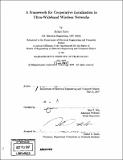| dc.contributor.advisor | Moe Z. Win. | en_US |
| dc.contributor.author | Lien, Jaime | en_US |
| dc.contributor.other | Massachusetts Institute of Technology. Dept. of Electrical Engineering and Computer Science. | en_US |
| dc.date.accessioned | 2008-05-19T16:06:04Z | |
| dc.date.available | 2008-05-19T16:06:04Z | |
| dc.date.copyright | 2007 | en_US |
| dc.date.issued | 2007 | en_US |
| dc.identifier.uri | http://hdl.handle.net/1721.1/41657 | |
| dc.description | Thesis (M. Eng.)--Massachusetts Institute of Technology, Dept. of Electrical Engineering and Computer Science, 2007. | en_US |
| dc.description | Includes bibliographical references (p. 89-93). | en_US |
| dc.description.abstract | Location-aware technologies have the potential to revolutionize computing, cellular services, sensor networks, and many other commercial, military, and social applications. In wireless networks, accurate information about an agent's location can give meaning to observed data and facilitate the agent's interactions with its surroundings and neighbors. Determining the location of one or more agents, known as localization or positioning, is a fundamental challenge. Most existing localization methods rely on existing infrastructure and hence lack the flexibility and robustness necessary for large ad-hoc networks. In this thesis, we describe a framework for localization that overcomes these limitations by utilizing cooperation: the agents in the network work together to determine their individual locations. We derive a practical algorithm for cooperative localization by formulating the problem as a factor graph and applying the sum-product algorithm. Each agent uses relative positioning measurements and probabilistic location information from its neighbors to iteratively update its location estimate. We investigate the performance of this algorithm in a network of ultra-wideband (UWB) nodes, which are well-suited for localization due to their potential to measure inter-node distances with high accuracy. Realistic models of UWB ranging error, based on an extensive measurement campaign in several indoor environments, are incorporated into the localization algorithm. Using the experimental data and simulations, we quantify the benefits that cooperation brings to localization. | en_US |
| dc.description.statementofresponsibility | by Jaime Lien. | en_US |
| dc.format.extent | 93 p. | en_US |
| dc.language.iso | eng | en_US |
| dc.publisher | Massachusetts Institute of Technology | en_US |
| dc.rights | M.I.T. theses are protected by
copyright. They may be viewed from this source for any purpose, but
reproduction or distribution in any format is prohibited without written
permission. See provided URL for inquiries about permission. | en_US |
| dc.rights.uri | http://dspace.mit.edu/handle/1721.1/7582 | en_US |
| dc.subject | Electrical Engineering and Computer Science. | en_US |
| dc.title | A framework for cooperative localization in ultra-wideband wireless networks | en_US |
| dc.type | Thesis | en_US |
| dc.description.degree | M.Eng. | en_US |
| dc.contributor.department | Massachusetts Institute of Technology. Department of Electrical Engineering and Computer Science | |
| dc.identifier.oclc | 219735388 | en_US |
